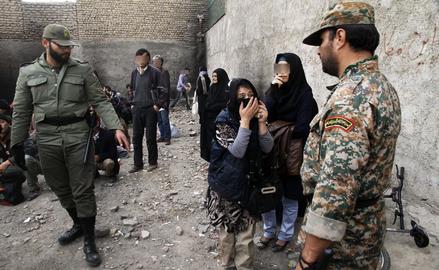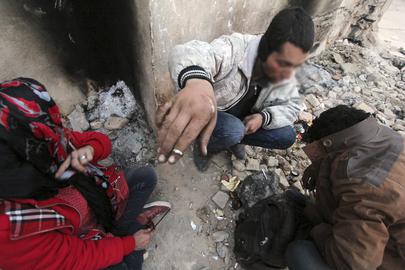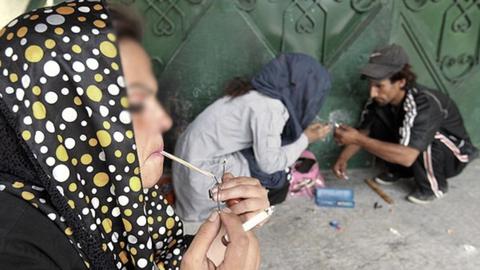Previously: Drugs in Iran: The "Moratorium" on the Death Penalty
The illicit drugs trade in Iran has shaped countless lives, exacerbated by punitive and misguided policies that have left some of society’s most vulnerable in the cold. In an exclusive new series for IranWire, academic Dariush Farahani lifts the lid on an under-reported contemporary crisis.
The aim of this series is to provide an insight into the drugs trade in Iran, including the impact of government policy on the drugs market, and to give a voice to marginalized communities affected by drugs that have been demonized in the media and public discourse.
Across the world and not least in Iran, drug users have been criminalized, stigmatized and treated as sick and malformed elements on the margins of society — a stance that strips them of their humanity and justifies harsh interventions into their lives. In recent years the so-called global “War on Drugs” has been questioned by an increasing number of actors. New human-centered and human rights-oriented policies and interventions are urgently needed to protect the rights of these individuals, and to prevent drug policy from further exacerbating violence, insecurity, and poor health outcomes in affected communities.
This series brings the global drug policy debate to Iran. We begin with an exploration of global drug policy before examining Iranian domestic drug policy in closer detail. Follow-up articles take in the breadth of drug users’ lived experiences in Iran and the haphazard management by government and civil society actors, based on interviews with people in Iran affected by drugs, be it as a user of opium, heroin or methamphetamine (shisheh), or by their involvement in the production, trafficking or distribution of illegal substances.
With the fall of the Shah and tight restrictions imposed in the public sphere, many young Iranians turned to drugs for the first time after 1979. What began as an idle pursuit for some became a long-term means of coping with existential pressure. In his latest article for IranWire, Dariush Farahani meets a government ministry employee addicted to opium.
Iran has consistently ranked second in the world in terms of the rate of adults dependent on opiates. Its proximity to Afghanistan, the biggest global producer of opium and heroin, has meant drugs are ubiquitous in Iranian society: available at low cost across the country.
In the years that followed the 1979 Islamic Revolution, the bars, restaurants, and social venues that flourished during the Shah’s reign were raided and shut down. During the war years, young Iranians found themselves with few opportunities to engage in recreational activities. The mourning of martyrs cast a shadow over public life, and everywhere the marks and war were visible and present: from murals and paintings, to the air raid sirens, an ongoing reminder of the fact that no one was safe. At the same time the harsh punishments meted out for unorthodox behaviour, from wearing T-shirts in public to being caught with alcohol or members of the opposite sex, saw a new generation of young Iranians pushed underground.
There, young people began experimenting with other forms of pleasure to take their minds off the difficulties of their new lives. Simultaneously, drugs started flowing into Iranian society in quantities never seen before. The use of heroin, which had been relatively low prior to the revolution, rapidly increased in Iran.
To understand what it was like living in Iran at the time, I arrange to stay overnight in Tehran with an acquaintance, Saeed, who is now in his mid-50s and has himself developed an addiction to opium.
Saeed has worked in administration for a government ministry for more than 30 years and was due for mandatory retirement, but begged his superiors to let him keep his job. He earns two and a half to three million toman per month. His salary has not increased for many years, and it is never clear how much he will be paid at the end of the month; this depends, it seems, on how much money is in the ministry. A few years ago, he was not paid for months on end because the ministry was starved of funding from central government.
When I wake in the morning and enter the living room, Saeed tells me he has not slept. All night, he was sitting on their small enclosed balcony, adjacent to the kitchen, smoking cigarettes. He is crying. He says he won’t go to work today, he can’t. He goes to the kitchen and opens a small canister with medication for his heart, which he tells me is in particular pain this morning. His two children do not know about his heart, and he never shares with them his worries about their future.
Saeed is a long-time opium smoker who has developed a strong dependence. For the past few years he has not been using but sourcing methadone from the black market to cope with his anxieties. Although this could be obtained legally via a treatment programme, that would mean his employers would find out and he would inevitably be sacked.
“We won’t watch any news anymore,” he says. “It just makes you more upset.”
Our meeting takes place shortly after US president Donald Trump withdrew the US from the nuclear deal. Last night, Trump had condemned Iran for being a “terrorist state” in front of the United Nations General Assembly.
Saeed had been visibly upset by the televised reports. “For every word that Trump speaks the dollar goes up,” he said. “For every word Rouhani speaks the toman goes down. Tomato puree was 4000 toman. Now it is 18000 toman. Things get more expensive by the hour. We’ll see if the country is here tomorrow or not. At the end of their speeches, we’ll see what the prices are.”
Rent and house prices have increased by 73 per cent, according to news bulletins. The family’s 12-month contract on their home has just come to an end, and they are waiting for the owner to return from the US to inform them how far their rent will increase.
“These are still the good days in comparison to what’s next,” Saeed’s wife says. “People in this country do not have any nerves left.”
Saeed adds: “If it was just me and my wife, we would eat bread and cheese and that would be it. But we have two children, and my daughter can’t marry because we can’t afford it. We have nothing to give.
“I have never told my children about our problems. I stay strong in front of them. I carry this burden myself. Only me and my wife know the extent of our problems.”
Sat on the floor in the living room, the discussion turns to drugs and drug use. Asked why some people become dependant, Saeed says: “The ones I’ve seen are emotional. They are kind but sensitive people. They think and worry too much about details in life; it makes these things bigger. You can’t say drug users are bad people. Or are they?
“Our own government’s policy is getting people addicted to methadone and other drugs. The government is the biggest actor at fault. The clinics are a formality; they provide another substance and do not care. Methadone and opium do not really differ. Our government knows this.
“Quitting drug use requires you to go into a different environment where you don’t have contact with the outside world. When quitting drugs, with economic and social problems, if your landlord calls and says ‘Your rent is late’ everything falls apart. Someone calls and says ‘Your interest is due’, and everything falls apart.
“I quit using drugs 100 times but after two to three days, the problems mounted and I started using again. You need a sponsor, not a doctor. You need someone to support your family for 1-2 months, while you are undergoing withdrawal, who supports your rent, gives your children food. In Europe, your sponsor is the government. They create an environment in which you can quit using drugs. We don’t have such a government here in Iran.”
Saeed tried to quit using drugs some years ago, but relapsed due to material pressures and a downturn in the economy. He now consumes one 20 milligram pill of methadone per day, which costs him around 124,000 toman a month on the black market. The pills are stored in a can in the kitchen cupboard labelled “Vitamins”.
A random drug test at work once flagged to Saeed’s employers that he was taking methadone. He was kept off work and expected that he would be fired. In that time, he said, his sister paid the rent and kept his children from going hungry.
“Someone else might not care so much about these hardships,” he says. “I can’t not care. For example, I can’t stop thinking about how we are going to afford my son’s TOEFL [Test of English as a Foreign Language] exams to give him a new chance in life.
“In my social class, only myself or my children can come first. So that our children come first, we don’t buy clothes for ourselves. We don’t eat fruit. In front of them, we pretend everything is okay. I only tell my wife, ‘Thank God my children don’t come asking for the newest phones’.”
He opens his mouth and shows his teeth, most of which have rotted away. To fix them, he estimates, would cost 700,000 toman per tooth: to fix them all would cost as much as an Iranian-manufactured Pride car. “I have insurance but I don’t use it,” he says, “so that my premium doesn’t go up and my children can use the insurance instead.
“If I go to a private doctor for my heart, they will charge me two million toman just to get inside the clinic. If I go to a government clinic, it is still expensive and they will do nothing at all: they’ll put some pills in my hand and tell me to get lost. If I decide to go to the doctor, there is nothing left for my family.
“When there’s a lot of pressure, I go out on the balcony and cry when my children are sleeping. When my crying does not empty me anymore, I swallow my sorrows and sleep.”
Saeed tells me the decision to share his experience with an outsider was a difficult one. “No one but me, my wife, and God know about these things,” he says. “Not my children, not anyone else.”
During the time of the Shah, Saeed recalls, older men could obtain opium through a coupon system. Back then, an old man in his neighbourhood would distribute the coupons to others.
He was first introduced to the drug by a friend at the age of 20, in the days of restricted personal freedoms after the Revolution.
“During the Shah’s time you could go out and drink a beer, go for a dance, go to a café,” he recalls. “It was all there, cheap and available, cinema, dance... these things existed.
“After the Revolution, all the recreational centres closed. Where could we gather? We told ourselves: ‘Let’s go to Mehrdad’s place and sit down together’. Alcohol was nowhere to be found. Someone said: ‘Let’s play cards’, and so we played cards. The next day someone would say: ‘But we played cards yesterday’, so we moved on to chess, then backgammon, and so on, until we didn’t find enjoyment in it anymore. This was also the time that drugs spread in our society. When we started using, we gathered a few young people like us together and had a couple of pokes, until it became more and more.”
Men who were insecure about their sexual performance, Saeed says, also began using opium under the misguided belief it would resolve their problems. Ill-informed grooms also started using it on their wedding nights.
His group would buy a portion of opium “the size of a large thumbnail” that then cost 600 toman between them. “We used two small metal skewers, one on which the opium is placed and the other heated above a gas flame to turn glowing red. You burn the opium with the glowing skewer, whilst inhaling the fumes through a plastic or metal tube.”
Returning to the present, Saeed says he blames a toxic culture of top-tier nepotism and hierarchical thinking in Iran for his own predicament. “For privileged individuals there is no law,” he says. “When I finished my studies and my military service I went to the bank, I did the tests and I was accepted. Eighteen times” At the end, I never got the job. Why? Because I had no parti [connections]. Because of this, I only got a job at the worst government ministry with the lowest salary, and the least benefits.
“Nepotism – parti bazi – is taking everyone else’s rights away. This is what our society has become. If our chances were equal, I would have made myself into one of the important people of this country. Instead, I had to go after drugs.
“It doesn’t matter if you have intellect, or if you have degrees. Whatever you have it does not matter unless you have parti or you are a martyr’s descendant, or a veteran.
“I cannot do anything for my son. The only thing we can pray and hope for is that he gets accepted for postgraduate studies abroad. For him to do the TOEFL exam, we need a foreign credit card to pay the fee. If I had contacts, I could make a call and it would be sorted. We have spent months trying to find someone to help us with this.
“These are the things that force me to “eat” methadone. What are we supposed to do? If I sell everything we own, everything in this home, it would get my family to the border of Afghanistan. We could not even afford to seek refuge in Afghanistan.
“In the end, my choice is to either kill myself or become addicted."
That evening, the value of the US dollar reaches 19,300 toman. Four weeks ago, it was 13,000.
Also in the series:
Drugs in Iran: A New IranWire Series
Selling Heroin After the Revolution
The "Moratorium" on the Death Penalty
A Meeting With Narcotics Anonymous
visit the accountability section
In this section of Iran Wire, you can contact the officials and launch your campaign for various problems



























comments